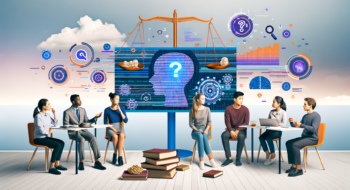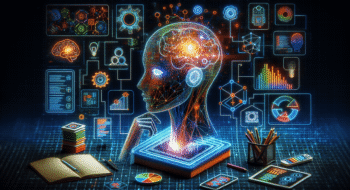OpenAI’s Shocking Elon Musk Revelations: No Lawsuits for AGI!
In a surprising turn of events, OpenAI has delivered a bold message to Elon Musk: he can’t “sue” his way “to AGI,” or artificial general intelligence. This statement marks a significant moment in the ongoing dialogue between one of technology’s most prominent figures and the world of AI development. As OpenAI asserts its commitment to responsible innovation, the revelations bring forth important questions about the ethical implications and future of AI technologies. OpenAI’s Shocking Elon Musk Revelations signal a new chapter in the quest for AGI, where collaboration may be more essential than litigation.
The Background: The Clash of Titans
Elon Musk is no stranger to the world of artificial intelligence. As one of the founding fathers of OpenAI, Musk helped launch the nonprofit initiative aimed at developing friendly AI that benefits humanity. However, his relationship with the organization has seen ups and downs, particularly as he raises concerns over the potential risks posed by advanced AI technologies. This brings us to the recent developments that find Musk and OpenAI at a crossroads. What are the implications of Musk’s legal jabs, and how might they reshape the future of AI?
A Declaration Against Litigation
OpenAI has issued a striking declaration that litigation will not serve as a viable pathway to achieving artificial general intelligence. This declaration aligns closely with their mission to foster ethical AI development and sustains a broader conversation within Silicon Valley about responsibility in innovation. By outlining the futility of legal threats, OpenAI is emphasizing a collaborative rather than combative approach to advancing AI technologies.
Elon Musk’s Rationale: A Protective Stance
Musk’s concerns regarding AI have been vocal and persistent. He has often warned about the potential for AI to become uncontrollable and perhaps even a hazard to humanity. In this light, his frustrations have sometimes manifested in legal maneuvers aimed at ensuring safety protocols within AI development. However, as OpenAI’s statement suggests, such tactics may not only be counterproductive but could also undermine the collaborative spirit essential for innovation.
The Ethical Conundrum
With the line drawn in the sand, the question arises: what does this mean for the ethical framework guiding AI development? OpenAI’s message resonates deeply with the growing recognition that ethics must not only be an afterthought but a fundamental component of AI research. Here are some ethical threads woven into this narrative:
- Transparency: OpenAI is calling for a transparent dialogue about AI’s capabilities and limitations, emphasizing that understanding is crucial to addressing fear and misunderstanding.
- Collaboration Over Competition: Cooperation among leading technology firms can pave the way for more profound discoveries and safer innovations.
- Public Engagement: Engaging a broader community in discussions about AI can help demystify the technologies and foster responsible development.
- Long-Term View: The pursuit of AGI should prioritize humanity’s future well-being rather than short-term gains.
Decoding the “No Lawsuits” Message
When OpenAI asserts that there are no pathways through litigation for achieving AGI, it raises critical themes about innovation. Essentially, OpenAI is suggesting that the best way to navigate the complex landscape of AI development is through creativity, partnership, and robust dialogue rather than contentious lawsuits. Here are a few key points:
- Innovation Flourishes in Freedom: Collaboration opens the door for innovative breakthroughs that lawsuits often stifle.
- Trust is Key: Building trust within the tech community and with the public sets the stage for collaborative efforts toward responsible AI.
- Long-term Solutions Over Short-term Fixes: Focus should shift from blaming competitors to finding mechanisms to address AI challenges collectively.
The Industry’s Response
The tech industry has watched this unfolding drama with keen eyes. Leaders and experts are evaluating how OpenAI’s stance may shape future interactions among AI firms and giants like Musk. Typically, strong rhetoric has taken a back seat to consensus-building in recent discussions. As industry stakeholders assess this announcement, there is potential for a transformative shift in the culture surrounding AI development.
The Collaborative Future of AI
So, what does the future hold? As OpenAI continues to champion the collaborative model for developing groundbreaking AI technologies, it’s essential to remember that the collective wisdom of many minds can yield extraordinary results. To illustrate this point, consider some collaborative possibilities:
- Cross-sector Partnerships: Technology, academia, and regulatory bodies could work together to establish shared principles for ethical AI development.
- Interdisciplinary Research: By bridging AI with various fields, we can address complex problems more holistically.
- Global Standards: Developing worldwide standards for ethical AI usage ensures a more secure and equitable future.
Reflecting on Ongoing Developments
It’s essential to acknowledge the challenging yet crucial balance between innovation and safety as conversations surrounding AI progress. OpenAI’s recent bold claims have proven to be a mirror reflecting the industry’s broader conversations about the need for responsible development and the ethical considerations tied to such advanced technologies. Collaborations forged from mutual trust and shared goals may offer better solutions than divisive litigation.
Parting Thoughts
The insights from OpenAI’s bold proclamation hint at a significant shift toward a more collaborative environment within the AI landscape. As the search for AGI continues, prevailing attitudes about litigation, competition, and responsibility will shape the future of technology development.
For those of us who are captivated by the potential that AI holds, this shift is not just about who can outsmart whom. It raises more profound implications about achieving meaningful success through collective effort. By reorienting the conversation around partnership and ethical norms, we might unravel the complexities of AGI and ensure its benefits are shared by humanity as a whole.
For more information on the future developments in AI, you can visit Neyrotex.com.







